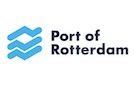 2020 was quite a special year for the Harbour Master’s Division of the Port of Rotterdam Authority. COVID-19 was a dominant factor in the port as well. Additional corona containment measures led to an increase in work pressure. Although employees had to perform considerably more tasks, work continuity was not compromised. In the port, one serious accident occurred when a hawser onboard a vessel broke. The number of sea-going vessels putting in at Rotterdam decreased by four percent: from 29,491 to 28,170.
2020 was quite a special year for the Harbour Master’s Division of the Port of Rotterdam Authority. COVID-19 was a dominant factor in the port as well. Additional corona containment measures led to an increase in work pressure. Although employees had to perform considerably more tasks, work continuity was not compromised. In the port, one serious accident occurred when a hawser onboard a vessel broke. The number of sea-going vessels putting in at Rotterdam decreased by four percent: from 29,491 to 28,170.
Safety
Both the nautical safety index for accidents (8) and the safety environmental index for inspections (7.8) showed a higher score than the target figure 7.5. Due to COVID-19, the number of inspections and fines was lower than normal, as the social distancing measure was complied with as much as possible in the port as well. The number of accidents (primarily parking damage) showed only a slight increase, from 113 to 122.
To an increasing extent, drones are deployed for safety and order on the water. The Port Authority regularly calls in the Joint Fire Brigade Drone Team for inspections in the event of accidents and possible spills. The Human Environment and Transport Inspectorate of the Ministry of Infrastructure and the Environment also conducts inspections using drones, for instance to measure emissions and detect illegal degassing.
The Port Authority organised the first package delivery by drone to the sea-going vessel Pioneering Spirit.
Vital sector
The port is of vital interest to the Netherlands. After all, it is in the port where our food, medicines, and various raw materials arrive. In March, when the Netherlands was reeling under COVID-19, the port of Rotterdam had to stay open.
‘We immediately took a number of measures to keep the port operational 24/7. All training was temporarily discontinued, we reduced the crew on vessels and staffing at operational posts to a minimum, and we work with the same crew as much as possible. We only meet when necessary, and we respect measures like social distancing where we can,’ René de Vries says.
GRIP 4: cooperation in times of corona
Since March, stage 4 of the Coordinated Regional Incident-Management Procedure (Gecoördineerde Regionale Incidentbestrijdings Procedure, GRIP 4) has been in place for the Rotterdam Safety Region. It is the highest state of alert, which applies to a calamity involving multiple municipalities. The Harbour Master’s Division is a partner in the Safety Region. Cooperation with the Safety Board, the GGD (Regional Health Service), and the municipality of Rotterdam is intensive, and there is regular contact between the Port Authority, the port business sector, and the service providers to discuss the lay of the land and establish any actions needed.
For the full press release, please click here.
